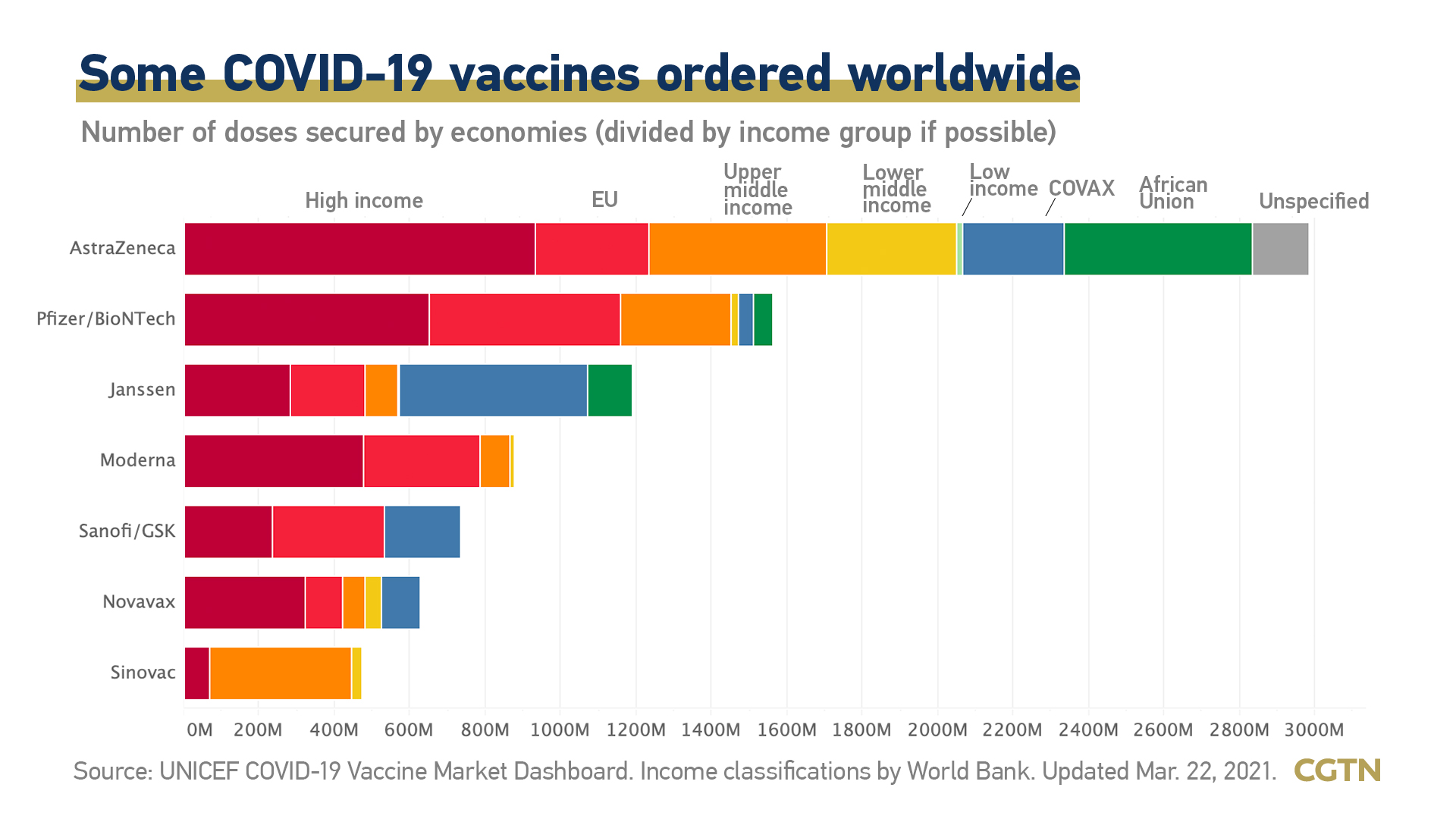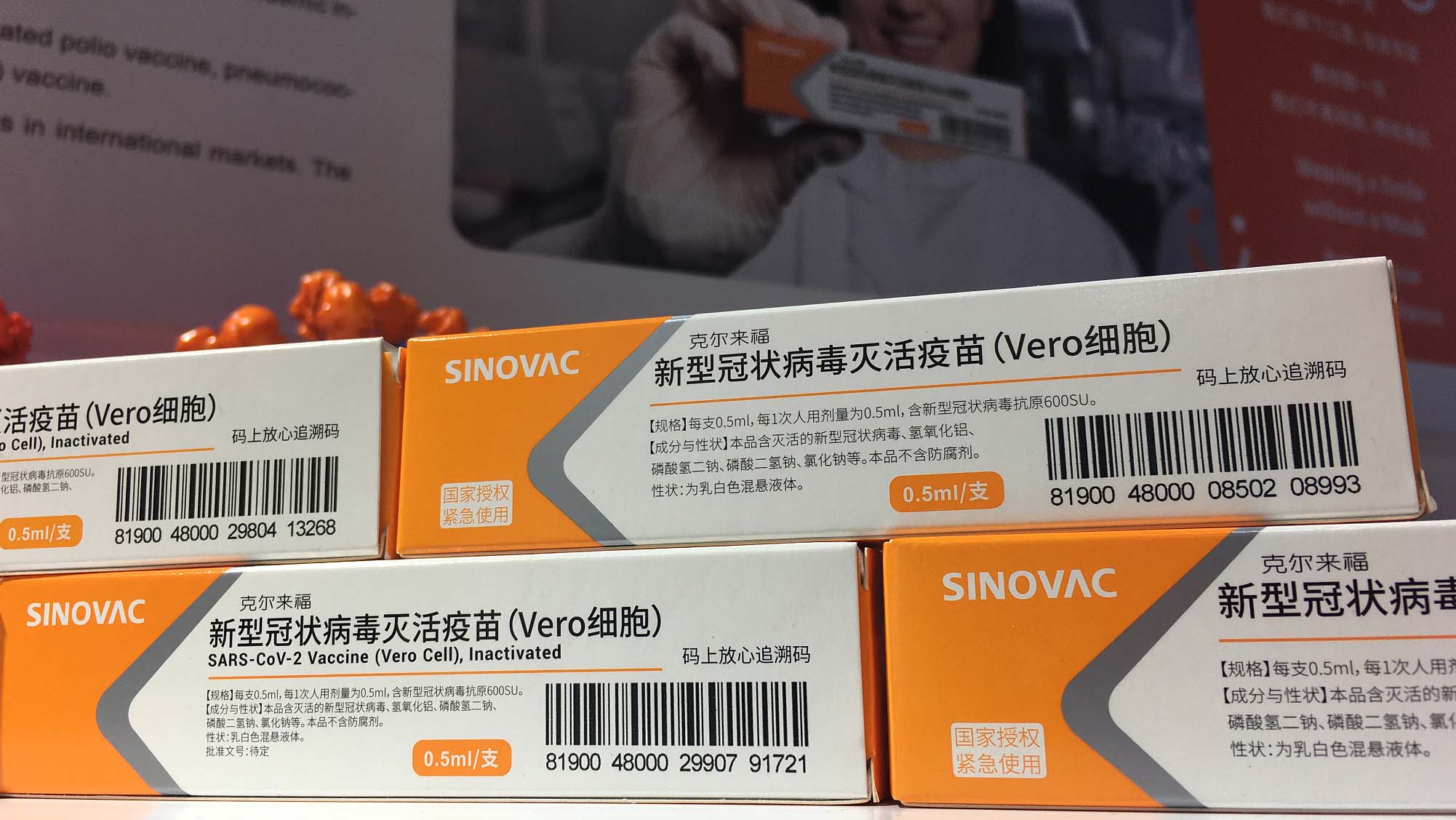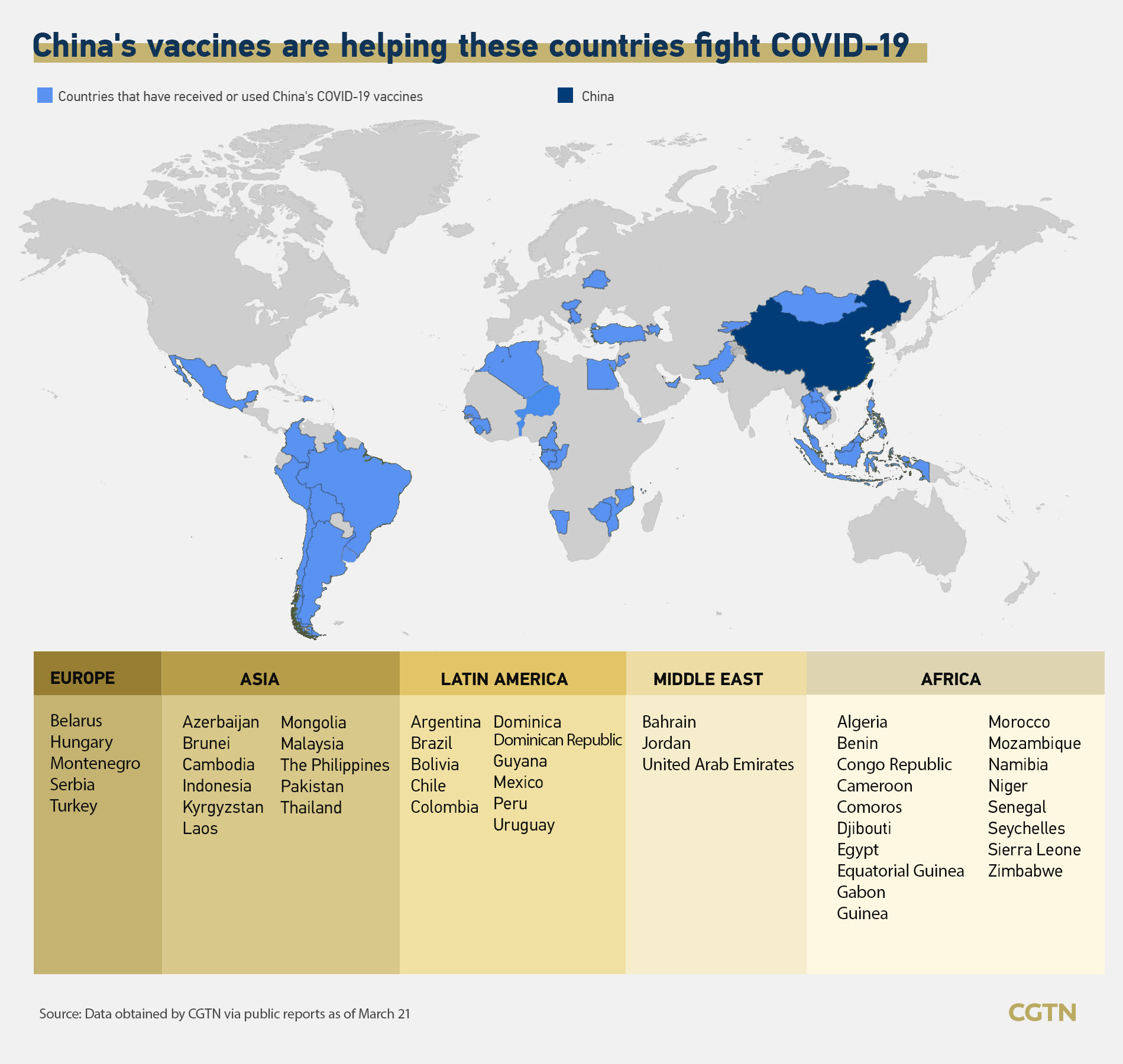Eight years ago, Chinese President Xi Jinping put forward a major global concept in his speech at the Moscow State Institute of International Relations, calling for joint efforts to establish a harmonious world where all could live peacefully with the spirit of brotherhood.
Eight years later, China's determination to provide COVID-19 vaccines to others shows that the country is transforming the vision of "building a community with a shared future for humanity" into action.
China addresses disparities in vaccine distribution
As the successful development of vaccines brings hope to ending the pandemic, World Health Organization (WHO) Director-General Tedros Adhanom Ghebreyesus has warned the distribution of vaccines could become "another brick in the wall of inequality between the world's haves and have-nots."

According to Duke University's Global Health Innovation Center's research in February, high-income countries, which represent only 16 percent of the world's population, have taken more than half of available doses.
Read more:
Graphics: What's the cost of 'vaccine nationalism'?
In the global fight against COVID-19, Xi has on various occasions stressed the importance of global health cooperation and called for building a community of common health for mankind.
China is not merely pioneering research and development of vaccines but pushing forward fair distribution and global cooperation of the antidote against the pandemic.
Official figures show that China has provided and is providing COVID-19 vaccine to 69 developing countries in urgent need while exporting vaccines to 43 countries.
Meanwhile, China has also decided to provide 10 million doses of vaccines to COVAX global initiative at the request of the WHO.
Last week, China also informed the UN chief of its decision to donate 300,000 doses of COVID-19 vaccines to UN peacekeepers, with priority given to the peacekeeping missions in Africa.
Chinese-made vaccine cast a global 'vote of confidence'
From Latin America to the Middle East, from South Asia to Eastern Europe, over 60 countries have cast a "vote of confidence" in Chinese vaccines, and China walks the talk as it has pledged to make its COVID-19 vaccines a global public commodity once they are developed and put into use.
Read more:
China's Vaccine Map: More countries using Chinese vaccines
More countries turn to Chinese COVID-19 vaccines
Thus, many world leaders have received COVID-19 vaccine shots developed by China and expressed their gratitude to China for providing or donating COVID-19 vaccines.
02:35

After receiving the first dose of the Chinese-made COVID-19 vaccine, Equatorial Guinean President Teodoro Obiang Nguema Mbasogo appealed to the entire population to get vaccinated, saying the Chinese vaccines are the most professional vaccines available.
Other African countries such as Senegal, Zimbabwe, Egypt, and Morocco have also received Chinese vaccines, which enabled them to launch their vaccination campaigns.
The Chinese-made vaccine also provided the Middle East region a much-needed shot in the arm at a critical moment as the region's total number of confirmed cases has recently surpassed 10 million. Countries like Algeria, Bahrain, Iraq and Turkey are all on the beneficiary list.
China is currently providing vaccines to 12 Latin American countries in need. Welcoming the arrival of flights carrying Chinese vaccines, Chilean President Sebastian Pinera said they marked a day "of joy, excitement, and hope," while Peruvian President Francisco Sagasti described the Chinese-made vaccines as "the best shield to protect ourselves and to care for all Peruvians."
Hungary is the first country in the EU that uses Chinese-made vaccines. The third batch of 100,000 doses of China's Sinopharm COVID-19 vaccine just arrived in Budapest last Wednesday, six weeks earlier than the agreed delivery time. Hungarian Prime Minister Viktor Orban has also received an injection of China's Sinopharm vaccine against COVID-19.
China has also been racing to help Asian countries fight the coronavirus pandemic with home-developed COVID-19 vaccines. Pakistan is the first country to receive China's vaccine aid. Defending the purchase of the COVID-19 vaccines developed by China, Philippine President Rodrigo Duterte has said that the Chinese vaccines are "safe, sure, and secure."

Why are Chinese-made vaccines popular?
Nearly 65 million COVID-19 vaccine doses had been administered across China with no severe adverse reactions reported, which fully proves that Chinese vaccines are safe.
Apart from the safety and effectiveness of China-developed vaccines, many countries turn to Chinese vaccines because of their accessibility and affordability.
Compared with other vaccines, Chinese vaccines do not require extremely stringent conditions for storage and transportation, which lowers the cost of vaccination and makes them easily accessible to poverty-stricken regions and developing countries.
Some other vaccines approved around the world have stricter cold chain requirements. For example, the COVID-19 vaccine developed by U.S. company Pfizer and German company BioNTech has to be stored at a temperature of minus 70 degrees Celcius.
The supplies of Western vaccines are not enough to meet the demand in major Western countries, let alone the rest of the world. For instance, the EU signed a deal for 300 million doses of the Pfizer-BioNTech vaccine in December, but there have been problems with production, delaying the block's rollout plan.
In the face of production bottlenecks and delivery delays, some Western countries have changed tones on COVID-19 vaccines developed by China, acknowledging that Chinese vaccines, like other effective ones, can play a role in their fight against the pandemic.
Even The New York Times has called for trusting Chinese vaccines, saying countries that welcomed Chinese vaccines made informed decisions.
(With input from Xinhua)
(Cover: A staff member unloads vaccines donated by China at a Philippine Air Force base in Manila, the Philippines, February 28, 2021. /Xinhua)

